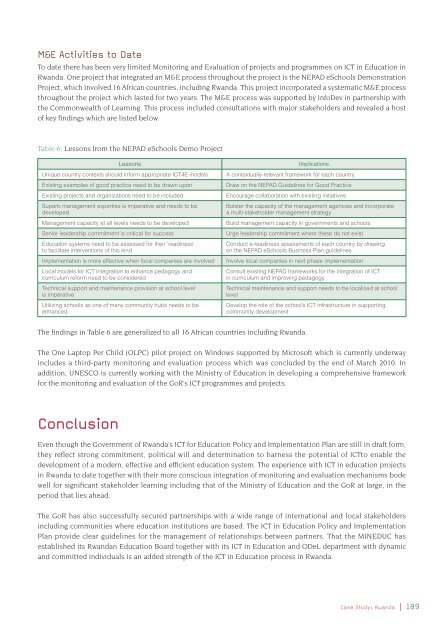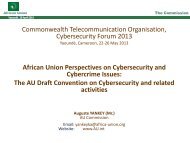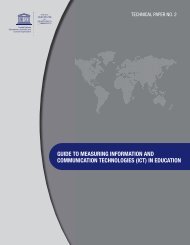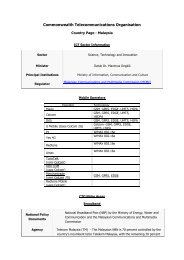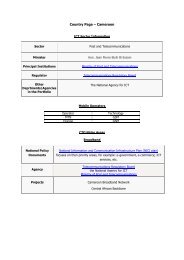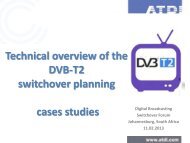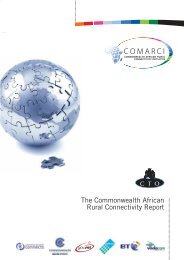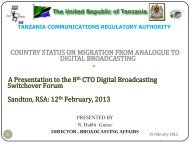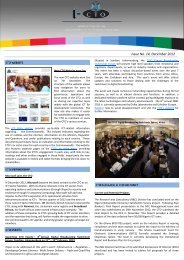Transforming education: the power of ICT policies - Commonwealth ...
Transforming education: the power of ICT policies - Commonwealth ...
Transforming education: the power of ICT policies - Commonwealth ...
You also want an ePaper? Increase the reach of your titles
YUMPU automatically turns print PDFs into web optimized ePapers that Google loves.
M&E Activities to Date<br />
To date <strong>the</strong>re has been very limited Monitoring and Evaluation <strong>of</strong> projects and programmes on <strong>ICT</strong> in Education in<br />
Rwanda. One project that integrated an M&E process throughout <strong>the</strong> project is <strong>the</strong> NEPAD eSchools Demonstration<br />
Project, which involved 16 African countries, including Rwanda. This project incorporated a systematic M&E process<br />
throughout <strong>the</strong> project which lasted for two years. The M&E process was supported by InfoDev in partnership with<br />
<strong>the</strong> <strong>Commonwealth</strong> <strong>of</strong> Learning. This process included consultations with major stakeholders and revealed a host<br />
<strong>of</strong> key fi ndings which are listed below.<br />
Table 6: Lessons from <strong>the</strong> NEPAD eSchools Demo Project<br />
Lessons Implications<br />
Unique country contexts should inform appropriate <strong>ICT</strong>4E models A contextually-relevant framework for each country<br />
Existing examples <strong>of</strong> good practice need to be drawn upon Draw on <strong>the</strong> NEPAD Guidelines for Good Practice<br />
Existing projects and organizations need to be included Encourage collaboration with existing initiatives<br />
Superb management expertise is imperative and needs to be<br />
Bolster <strong>the</strong> capacity <strong>of</strong> <strong>the</strong> management agencies and incorporate<br />
developed<br />
a multi-stakeholder management strategy<br />
Management capacity at all levels needs to be developed Build management capacity in governments and schools<br />
Senior leadership commitment is critical for success Urge leadership commitment where <strong>the</strong>se do not exist<br />
Education systems need to be assessed for <strong>the</strong>ir ‘readiness’<br />
Conduct e-readiness assessments <strong>of</strong> each country by drawing<br />
to facilitate interventions <strong>of</strong> this kind<br />
on <strong>the</strong> NEPAD eSchools Business Plan guidelines<br />
Implementation is more effective when local companies are involved Involve local companies in next phase implementation<br />
Local models for <strong>ICT</strong> integration to enhance pedagogy and<br />
Consult existing NEPAD frameworks for <strong>the</strong> integration <strong>of</strong> <strong>ICT</strong><br />
curriculum reform need to be considered<br />
in curriculum and improving pedagogy<br />
Technical support and maintenance provision at school level<br />
Technical maintenance and support needs to be localized at school<br />
is imperative<br />
level<br />
Utilizing schools as one <strong>of</strong> many community hubs needs to be Develop <strong>the</strong> role <strong>of</strong> <strong>the</strong> school’s <strong>ICT</strong> infrastructure in supporting<br />
enhanced<br />
community development<br />
The fi ndings in Table 6 are generalized to all 16 African countries including Rwanda.<br />
The One Laptop Per Child (OLPC) pilot project on Windows supported by Micros<strong>of</strong>t which is currently underway<br />
includes a third-party monitoring and evaluation process which was concluded by <strong>the</strong> end <strong>of</strong> March 2010. In<br />
addition, UNESCO is currently working with <strong>the</strong> Ministry <strong>of</strong> Education in developing a comprehensive framework<br />
for <strong>the</strong> monitoring and evaluation <strong>of</strong> <strong>the</strong> GoR’s <strong>ICT</strong> programmes and projects.<br />
Conclusion<br />
Even though <strong>the</strong> Government <strong>of</strong> Rwanda’s <strong>ICT</strong> for Education Policy and Implementation Plan are still in draft form,<br />
<strong>the</strong>y refl ect strong commitment, political will and determination to harness <strong>the</strong> potential <strong>of</strong> <strong>ICT</strong>to enable <strong>the</strong><br />
development <strong>of</strong> a modern, effective and effi cient <strong>education</strong> system. The experience with <strong>ICT</strong> in <strong>education</strong> projects<br />
in Rwanda to date toge<strong>the</strong>r with <strong>the</strong>ir more conscious integration <strong>of</strong> monitoring and evaluation mechanisms bode<br />
well for signifi cant stakeholder learning including that <strong>of</strong> <strong>the</strong> Ministry <strong>of</strong> Education and <strong>the</strong> GoR at large, in <strong>the</strong><br />
period that lies ahead.<br />
The GoR has also successfully secured partnerships with a wide range <strong>of</strong> international and local stakeholders<br />
including communities where <strong>education</strong> institutions are based. The <strong>ICT</strong> in Education Policy and Implementation<br />
Plan provide clear guidelines for <strong>the</strong> management <strong>of</strong> relationships between partners. That <strong>the</strong> MINEDUC has<br />
established its Rwandan Education Board toge<strong>the</strong>r with its <strong>ICT</strong> in Education and ODeL department with dynamic<br />
and committed individuals is an added strength <strong>of</strong> <strong>the</strong> <strong>ICT</strong> in Education process in Rwanda.<br />
Case Study: Rwanda | 189


